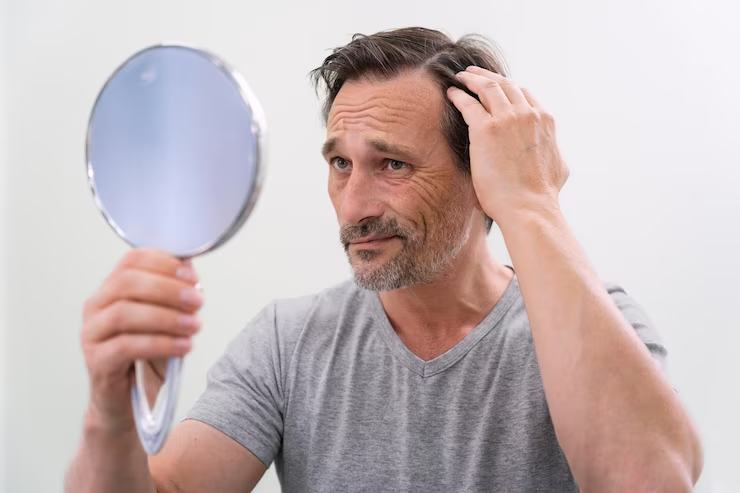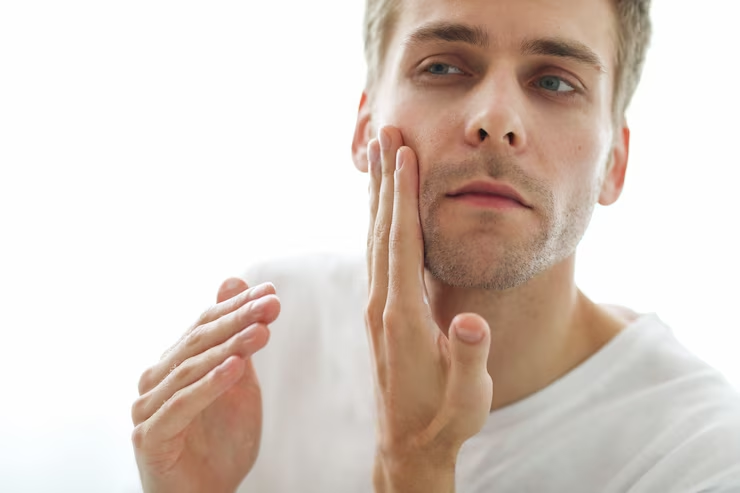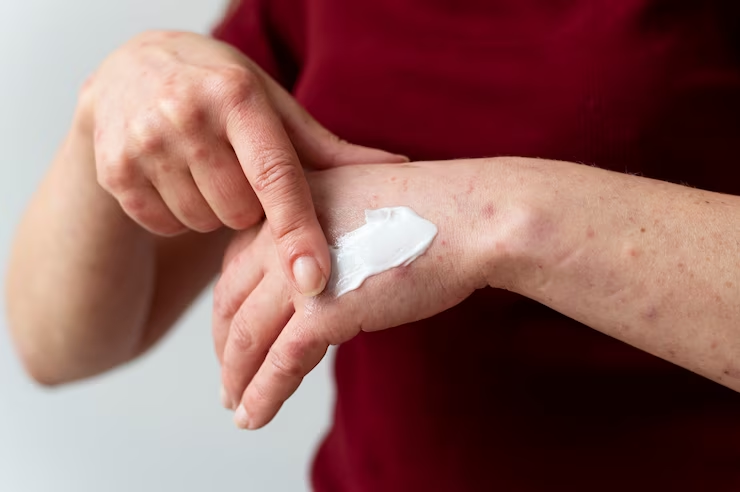
Are you one of those individuals who experience the frustrating ordeal of itchy skin after a refreshing shower? If so, you're not alone. Dealing with post-shower itchiness can be incredibly bothersome, leaving you scratching your skin and searching for solutions. The good news is that there are effective ways to alleviate and even get rid of itchy skin after a shower.
This comprehensive guide will explore how to get rid of itchy skin after shower and provide valuable insights and practical tips to regain your comfort and peace of mind. We've got you covered whether dry skin, hot water, harsh shower products, or underlying skin conditions triggering your itchiness. So, let's dive in and discover the secrets to bid farewell to post-shower itchiness once and for all.
What Causes Itchy Skin After Shower?
It's crucial to understand the underlying causes triggering this uncomfortable sensation to get rid of itchy skin after a shower. Let's explore the potential reasons behind post-shower itchiness and how to address each one.

Dry skin
: One of the most common culprits behind itchy skin after a shower is dryness. Hot water, although soothing, can strip away the natural oils from your skin, leaving it dehydrated and prone to itching. To combat this, consider moisturizing your skin before stepping into the shower. This helps create a protective barrier and prevents excessive moisture loss. Skin feels dry and tight after a shower, especially during winter months when humidity is low.Hot water:
While a steaming hot shower may feel heavenly, it can wreak havoc on your skin. The intense heat can strip away the essential oils that maintain your skin's moisture balance, leading to itchiness. To alleviate this issue, opt for lukewarm water instead. It may not provide the same instant comfort, but it will prevent excessive drying and irritation.Harsh soaps or shower products
: The products you use during your shower routine can significantly impact your skin's health. Harsh soaps, body washes containing harsh chemicals, and fragrances can irritate the skin, resulting in itchiness. Switch to gentle and hypoallergenic products specifically formulated for sensitive skin. Lathering your skin too much with soaps can also lead to dryness and itching.Allergies or skin conditions
: Sometimes, post-shower itchiness can be a symptom of underlying allergies or skin conditions. If you notice persistent or severe itching, along with other symptoms like redness or rashes, it's essential to consult a dermatologist for a proper diagnosis and personalized treatment plan. They can help identify allergies or skin conditions and recommend appropriate remedies or medications.Certain harsh weather conditions
: Excessive heat and humidity may result in heat rash (prickly heat), sun rash, sun allergies or sun burns that can lead to itchiness especially after a shower. Apply a sunscreen of at least SPF 30 before going out doors.Preparing for the Shower
Proper preparation is key to ensuring a soothing and itch-free shower experience. You can minimize the risk of post-shower itchiness by implementing a few simple steps before the shower. Let's explore some essential tips on how to get rid of itchy skin after shower by preparing in advance.

Optimal water temperature and duration:
Hot water can strip away the skin's natural oils, leading to dryness and itching. Adjust the water temperature to lukewarm or slightly cooler to avoid exacerbating these issues. Keep showers cool and short as possible. Keep your shower time within a reasonable limit, aiming for 10-15 minutes. If you can’t shower in cold water, go for lukewarm water. But avoid long hot baths. Prolonged exposure to water can further dehydrate the skin, causing discomfort.Moisturizing before showering
: One effective way to combat dryness-induced itchiness is to apply a moisturizer before showering. Choose a hydrating lotion or cream and generously massage it onto your skin. This pre-shower moisturizing technique creates a protective barrier, minimizing moisture loss during showering.Choosing gentle and hypoallergenic products
: When it comes to shower products, opt for gentle and hypoallergenic options. Harsh soaps, body washes with strong fragrances or chemical-laden products can irritate the skin and trigger post-shower itchiness. Look for mild cleansers specifically formulated for sensitive skin. Natural ingredients like shea butter or glycerin can help retain moisture and promote skin health. You can put bath oil, baking soda or colloidal oatmeal to your bathwater, to keep your skin moisturized.Avoid harsh exfoliation techniques
: While exfoliating your skin can be beneficial, overly aggressive or abrasive techniques can damage the skin's protective barrier, leading to dryness and itchiness. Opt for gentle exfoliators and use them sparingly, focusing on areas prone to dryness, such as elbows or knees. Remember to be gentle and avoid excessive scrubbing. Avoid harsh sponges, loofah and rough washcloths.During the Shower
While in the shower, incorporating specific practices can help alleviate itchy skin after shower and enhance your overall bathing experience. Let's explore some essential techniques to implement during the shower to combat post-shower itchiness:
Use lukewarm water instead of hot water
: As tempting as a steaming hot shower may be, opting for lukewarm water is crucial in preventing excessive dryness and itchiness. Hot water can strip away the natural oils from your skin, leaving it vulnerable to irritation and discomfort. Stick to a moderate water temperature to maintain your skin's moisture balance.Be mindful of the time spent in the shower
: Prolonged exposure to water can further dehydrate the skin and exacerbate post-shower itchiness. Keep your showers brief, aiming for 10-15 minutes. This helps minimize moisture loss and maintains the skin's natural hydration.Consider using mild cleansers or moisturizing body washes
: Harsh soaps or body washes containing harsh chemicals can dry and irritate the skin. Opt for mild cleansers specifically formulated for sensitive or dry skin. Alternatively, choose moisturizing body washes that help hydrate and nourish the skin while cleansing.Avoid using loofahs or rough washcloths
: Loofahs or rough washcloths can be too abrasive for sensitive skin, leading to micro-tears and further irritation. Instead, use soft, gentle washcloths or your hands to cleanse your body. Lightly massage the cleanser onto your skin using circular motions to avoid unnecessary friction.Post-Shower Care
Proper post-shower care plays a vital role in getting rid of itchy skin after shower and maintaining a healthy skin barrier. By following these essential practices, you can help seal in moisture, soothe your skin, and prevent post-shower itchiness:

Pat dry instead of rubbing vigorously
: Gently pat your skin with a soft towel to remove excess water after showering. Avoid rubbing vigorously, as this can further irritate and dry the skin. Leaving moisture on the skin before applying moisturizer can help lock in hydration.Apply a moisturizer within a few minutes of drying off:
Moisturizing is key to combating post-shower itchiness. Choose an unscented moisturizer that suits your skin type and apply it while your skin is still slightly damp. This helps trap moisture and enhances the absorption of the moisturizer, providing long-lasting hydration.Consider using moisturizers with soothing ingredients
: Look for moisturizers that contain soothing ingredients such as aloe vera, chamomile, or oatmeal. These ingredients can help calm irritated skin and provide relief from itchiness. Avoid moisturizers with fragrances or harsh chemicals that may exacerbate sensitivity.Utilize natural remedies, such as aloe vera or oatmeal baths
: If you experience persistent itchiness, you can incorporate natural remedies to alleviate discomfort. Aloe vera gel can be applied topically to soothe and hydrate the skin. Alternatively, taking an oatmeal bath by adding finely ground oatmeal to lukewarm water can provide relief for irritated and itchy skin.Remember, consistency is key when it comes to post-shower care. Make moisturizing a part of your daily routine, especially after every shower, to maintain optimal skin hydration and minimize post-shower itchiness. Avoid powders, aftershaves or soaps that are alcohol based or scented with fragrances.
Addressing Specific Causes of Itchy Skin After Shower
To effectively get rid of itchy skin after shower, addressing specific underlying causes is essential. Let's explore common causes of post-shower itchiness and discover targeted solutions for each scenario:

If dry skin is the culprit
:Regular moisturizing
: Make moisturizing a part of your daily skincare routine before and after showering. Use a thick, emollient moisturizer that locks in moisture and helps restore your skin's natural barrier.Hydrating oils
: Consider incorporating hydrating oils, such as almond oil, coconut oil, or jojoba oil, into your post-shower routine. Apply a few drops to damp skin to enhance moisture retention.
If hot water is triggering the itch
:Opt for lukewarm showers
: Lower the water temperature to lukewarm or cool to prevent excessive skin drying. Gradually reduce the temperature to a comfortable level that doesn't exacerbate itchiness.Cold compresses
: In case you get your skin itchy after shower and irritated after a hot shower, apply a cold compress or ice pack wrapped in a thin cloth to soothe the area and reduce inflammation.
If harsh soaps or shower products are causing the itch
:Switch to gentle cleansers
: Choose mild, fragrance-free, and hypoallergenic cleansers specifically formulated for sensitive skin. Look for products with nourishing ingredients like shea butter or glycerin to help replenish moisture.Test new products
: Whenever trying new shower products, perform a patch test on a small area of skin before applying them all over your body. This helps you identify any potential allergic reactions or irritations.
If allergies or skin conditions are contributing to itchiness:
Seek medical advice:
If you suspect underlying allergies or skin conditions, consult a dermatologist for a proper diagnosis and personalized treatment plan.Follow prescribed treatments
: If diagnosed with a specific skin condition, follow your dermatologist's recommended treatments, which may include topical creams, ointments, or oral medications.
There are certain conditions that are found to cause itching after a shower
Aquagenic urticaria
- hives caused by waterIdiopathic aquagenic pruritus
- skin itching following contact with water, but the reason is unknownCholinergic urticaria
- hives caused by increase in body temperature Other medical conditions like lymphoma and chronic bone marrow disease (polycythemia vera)Xerosis (winter itch)
- Sebum secretion is low due to certain environmental conditions (such as during winter dry heated indoor air can strip off the moisture from skin or exposure to sun and strong winds). Sebum creates a protective barrier and helps skin stay moisturized.If you suspect any of these conditions, discuss with your doctor for further investigations and treatment if confirmed.
Additional Tips and Preventive Measures
In addition to the specific solutions discussed earlier, adopting certain practices and preventive measures can help you maintain itch-free skin after a shower. Consider the following tips to promote overall skin health and prevent future episodes of getting your skin itchy after shower:
Stay hydrated
: Hydrating your body from the inside out is essential for maintaining healthy skin. Drink adequate water throughout the day to keep your skin hydrated and prevent dryness.Avoid harsh fabrics:
Choose soft, breathable fabrics for your clothing, towels, and bedding. Rough or synthetic materials can cause friction and irritation, leading to post-shower itchiness. Opt for natural fibers like cotton or bamboo.Wearing loose fitting clothes, sun protective items like hats, cotton garments can ease the itchiness.
Use fragrance-free laundry products
: Fragrances and harsh chemicals in laundry detergents and fabric softeners can irritate sensitive skin. Opt for fragrance-free and hypoallergenic options when washing your clothes, towels, and bed sheets.Humidify your living space
: Dry indoor air can improve skin dryness. Use a humidifier in your home, especially during the colder months, to add moisture to the air and prevent excessive dryness.Be mindful of temperature and humidity
: Extreme temperatures and low humidity levels can affect your skin's moisture balance. Consider using a humidifier and adjusting the thermostat during winter or in dry climates to maintain a comfortable and skin-friendly environment.Avoid scratching
: Although tempting, scratching can irritate the skin and worsen itchiness. Instead, gently pat or apply a cold compress to soothe the itchy areas.Practice stress management
: Stress can exacerbate skin conditions and trigger itchiness. Incorporate stress management techniques into your daily routine, such as meditation, deep breathing exercises, yoga or engaging in activities you enjoy.Apply a petrolatum based product (cream or ointment) to waterproof your skin prior to a shower will help urticaria or itching related to contact with water,
When to Seek Professional Help

While most cases of getting your skin itchy after shower can be effectively managed with self-care and preventive measures, there are instances when it's important to seek professional help. If you experience persistent or severe itchiness that does not improve with home remedies, it may be time to consult a healthcare professional or dermatologist. Here are some situations where seeking professional help is recommended:
Chronic or worsening symptoms
: If your itchy skin after a shower persists for an extended period or worsens over time, despite following preventive measures and using over-the-counter remedies, it's advisable to seek medical attention. This could be a sign of an underlying skin condition that requires proper diagnosis and treatment.Presence of other symptoms
: If you notice additional symptoms accompanying your post-shower itchiness, such as redness, red bumps (urticaria), swelling, rash, or sores, it's important to consult a healthcare professional. These symptoms may indicate an allergic reaction, infection, or other skin conditions that require medical evaluation.Impact on daily life
: If the itchiness after a shower significantly affects your quality of life, interfering with sleep, work, or daily activities, it's crucial to seek expert guidance. A healthcare professional can assess the severity of your condition and recommend appropriate treatments (like antihistamine) to alleviate your symptoms.History of skin conditions or allergies
: If you have a known history of skin conditions like eczema, psoriasis, or allergies, and your post-shower itchiness persists or worsens, it's advisable to consult a dermatologist. They can provide specialized care and tailor treatment options for your needs.Conclusion
You can effectively get rid of the discomfort by understanding the causes of itchy skin after a shower and implementing appropriate strategies, such as adjusting water temperature, using gentle products, and practicing post-shower care. Additionally, addressing specific causes like dry skin or underlying conditions and adopting preventive measures like staying hydrated and using gentle fabrics can promote overall skin health and prevent future itchiness.
While self-care measures are often sufficient, seeking professional help is recommended if symptoms persist or worsen. Embrace the soothing and rejuvenating experience of a shower with the assurance of itch-free skin and restored comfort.





